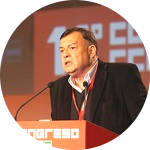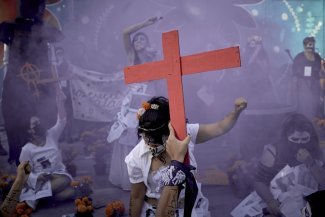
The appearance of Karen Longaric, foreign affairs minister of Bolivia’s de facto government, before the European Parliament received scant media attention. Major outlets did not cover criticism of Longaric by several MEPs who accused her of using the forum as an electoral campaign platform.
Longaric spoke in Brussels on Thursday, 1 October, where she received harsh criticism from Members of Parliament such as the Green MEP Ernest Urtasun, who said: “We are concerned about respect for constitutional legality in Bolivia and you have come to hold an election rally instead of explaining to us how you plan to ensure free elections. You represent an oligarchy that could never tolerate 30 per cent of poor people moving into the middle class and organised a coup in response.”
Javi Lopez of the Socialists’ Party of Catalonia went on to condemn Longaric’s speech, saying: “The last thing this parliament wants is to invite a government during an election period that appears to use this platform as an electoral mechanism. The interim government has overstepped its bounds; it is presenting itself as an arbiter in traumatic and borderline situation for the country.”
Idoia Villanueva of Podemos told her: “Frankly, what we just experienced is an act of institutional disrespect. I was hoping, Chancellor, that you would talk about how you were going to guarantee free and democratic elections.”
Izaskun Bilbao of the Basque Nationalist Party expressed concern “that the armed forces, under the guise of military secrecy, are not handing over information on the Sacaba and Senkata massacres on the 15th and 18th of November 2019.” Other MEPs expressed concern regarding the role played by the military in installing an unelected government and in the exile of the former Bolivian president Evo Morales.
Democratic and economic challenges
After three postponements of the election and attempts by the de facto government to retain its hold on power, popular movements and union efforts have forced the government to fix an election date.
On 18 October, a new president and vice president will finally be elected, and the entire Plurinational Legislative Assembly will be renewed.
This is not simply a matter of an electoral calendar, but of restoring democracy and the rule of law in the Andean-Amazon country.
The report Crisis de Estado, Violación de los Derechos Humanos en Bolivia, Octubre-Diciembre de 2019 (Crisis of the State, the Violation of Human Rights in Bolivia, October-December 2019) published by the Defensoría del Pueblo (Ombudsman’s Office) shows that massacres, torture, arbitrary arrests and systematic violations of individual rights, resulting in 37 deaths, were used to undermine the constitutional order. According to the 313-page publication: “Crimes against humanity were committed in Bolivia.”
A presidential debate between the seven candidates took place on Saturday, 3 October. Only two of them have a real chance of winning the presidency at this delicate moment. They are Luis Arce, candidate for the Movement for Socialism (MAS), who leads in all of the polls and could win in the first round as he exceeds 40 per cent of voting intentions in the majority of polls, 10 per cent ahead of his closest competitor, Carlos Mesa of Civic Community (CC).
According to Arce, who served for many years as Evo Morales’ economy minister: “The mandate is to get our country back, to return to a path of sustainable development, economic growth and certainty.” He wants to raise taxes on the wealthy. The unemployment rate was 4.2 per cent when the coup forced Evo from power; today it stands at 12 per cent.
Arce believes that “the country’s problem is not just unemployment but a lack of income. That’s why aid vouchers are critical.” He claims that biodiesel will create 200,000 direct and indirect jobs and 41 new industries that will generate new jobs for citizens.
Carlos Mesa, who served as president between 2003 and 2005, says that if he is elected he will convene a “permanent economic and social council composed of government, business leaders and workers with objectives that guarantee the preservation and sustainability of jobs, new job creation, and shared efforts by each party to achieve them.
The country’s economic situation, which according to the survey by the Latin American Strategic Centre for Geopolitics (CELAG) is a major concern for 55.4 per cent of the population, is the main problem that the next government will have to resolve. The challenge of the hour is to rescue a democracy that has been taken hostage.








